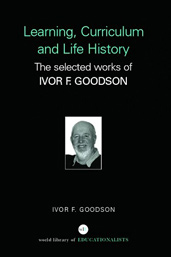Learning, Curriculum and Life Politics: the selected works of Ivor F. Goodson
The Story So Far
The relationship of studies of teachers' stories to the academy sits, I believe, at the centre of one of the major ethical and methodological issues involved in any move to develop collaborative use of stories. Of course, views of the academy cover a wide spectrum from a belief in its role in the ‘disinterested pursuit of knowledge’ through to the assertion of the Situationist International that "The intelligentsia is power's hall of mirrors." In general, I would take a position which stresses the interestedness rather than disinterestedness of the academy. I see a good deal of empirical evidence that David Tripp's (1987) contention in this matter may be correct for he argues that: "When a research method gains currency and academic legitimacy, it tends to be transformed to served the interests of the academy (p. 2)".
Becker (1970) has commented on the "hierarchy of credibility regarding those to whom we tend to listen". This has general relevance to our research on schooling and school systems and specifically to our desire to listen to the teacher's voice.
In any system of ranked groups, participants take it as given that members of the highest group have the right to define the way things really are. In any organization, no matter what the rest of the organization chart shows, the arrows indicate the flow of information point up, thus demonstrating (at least formally) that those at the top have access to a more complete picture of what is going on than anyone else. Members of lower groups will have incomplete information and their view of reality will be partial and distorted in consequence. Therefore, from the point of view of a well socialized participant in the system, any tale told by those at the top intrinsically deserves to be regarded as the most credible account obtainable of the organizations' workings (p. 126).
He provides a particular reason why accounts ‘from below’ may be unwelcome:
officials usually have to lie. That is a gross way of putting it, but not inaccurate. Officials must lie because things are seldom as they ought to be. For a great variety of reasons, well-known to sociologists, institutions are refractory. They do not perform as society would like them to. Hospitals do not cure people; prisons do not rehabilitate prisoners; schools do not educate students. Since they are supposed to, officials develop ways both of denying the failure of the institution to perform as it should and explaining those failures which cannot be hidden. An account of an institution's operation from the point of view of subordinates therefore casts doubt on the official line and may possibly expose it as a lie (p. 128).
For these reasons the academy normally accepts the ‘hierarchy of credibility’: "we join officials and the man in the street in an unthinking acceptance of the hierarchy of credibility. We do not realize that there are sides to be taken and that we are taking one of them". Hence Becker argues that for the academic researcher:
The hierarchy of credibility is a feature of society whose existence we cannot deny, even if we disagree with its injunction to believe the man at the top. When we acquire sufficient sympathy with subordinates to see things from their perspective, we know that we are flying in the face of what ‘everyone knows’. The knowledge gives us pause and cause us to share, however briefly, the doubt of our colleagues (p. 129).
